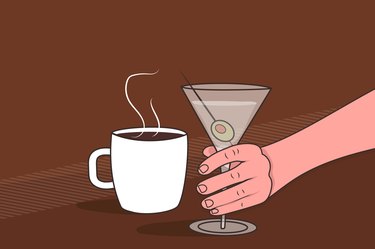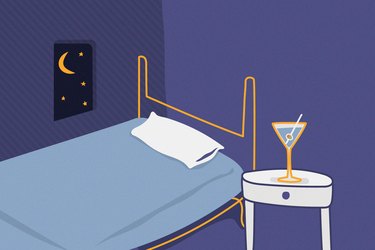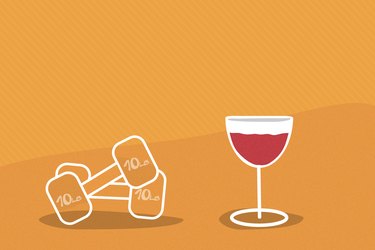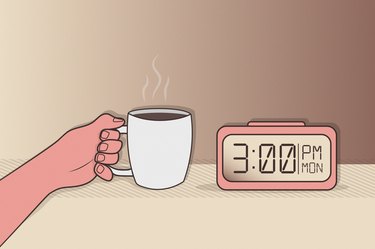
Whether your cocktail of choice is an espresso martini or a Diet Coke and rum, mixing alcohol with caffeine, in theory, sounds like a good idea: You get a nice buzz with a hit of energy. But if you could look at what was really going on inside your body, you'd probably change your mind.
Caffeine is a stimulant, meaning it makes you feel awake and more alert, while alcohol has both sedating and stimulating effects. Alcohol is also a depressant, according to the U.S. National Library of Medicine, so it slows down your brain activity and impairs your judgment, cognitive function and memory.
Video of the Day
Video of the Day
Here are all the reasons you might want to pass on those flat white martinis and mudslides (or at least make it an occasional drink). Plus, find out if drinking caffeine after alcohol can help lower your blood alcohol levels and whether Red Bull vodkas are safe.
5 Reasons to Limit Mixing Alcohol and Caffeine
1. It Lowers Your Inhibitions
"While that vodka and Red Bull might seem like a great idea (who doesn't love the idea of staying perky and extending the evening?), the problem is that caffeine has the ability to mask the depressive effects of alcohol, making it all too easy to reach for another drink... and another," Nicole Rodriguez, RDN, dietitian and personal trainer based in New York, tells LIVESTRONG.com.
"Not only is there the possibility for consuming more alcohol than planned, but there is an increased risk for lowered inhibitions and risky behavior."
People who mix alcohol with energy drinks are more likely than those who don't mix alcohol with energy drinks to report unwanted or unprotected sex, driving drunk or riding with a driver who was intoxicated or sustaining alcohol-related injuries, per the Centers for Disease Control and Prevention (CDC).
So while enjoying an espresso martini on occasion is probably fine, if you're not able to stick to CDC's recommended amount for moderate drinking — which is one alcoholic drink for people assigned female at birth and up to two for people assigned male at birth per day — then you might put yourself and others in harm's way.
2. It Can Cause High Blood Pressure and Irregular Heartbeat
Due to their stimulating and sedating effects, caffeinated alcoholic beverages can make your ticker flutter — and not in a good way. This is particularly concerning for people living with heart conditions, says Bonnie Taub-Dix, RDN, CDN and author of Read It Before You Eat It: Taking You from Label to Table.
"Caffeine in itself is a stimulant and alcohol can negatively affect blood pressure," Taux-Dix says.
That's because drinking one too many alcoholic beverages can increase your blood pressure, according to the Mayo Clinic. Research shows that alcohol can raise blood pressure in several ways.
For one, it can increase the hormone renin, which can constrict your blood vessels. This stimulates the hormones vasopressin and aldosterone, which promote fluid retention, according to a July 2020 review in the Cochrane Database of Systematic Reviews. The higher blood volume causes high blood pressure.
Alcohol has also been shown to stimulate the sympathetic nervous system and increase noradrenaline (a neurotransmitter) levels — and this stimulates the receptors in the heart and increases heart rate and blood pressure, per the July 2020 paper in the Cochrane Database of Systematic Reviews.
3. It Can Make Anxiety and Depression Symptoms Worse
The link between alcohol and depression has been well-established. Although caffeinated alcoholic drinks may make you feel good at first, they might actually make your anxiety and depression worse.
"Because mixing alcohol with caffeinated beverages has the potential to make both more palatable (many of these concoctions tend to go down easily), not only is there the concern of taking in excessive alcohol but also excessive caffeine, which can increase heart rate, stimulate feelings of jitteriness and make it harder to fall asleep — even worse than alcohol alone," Rodriguez explains. "This has a cascading effect the next day."
The cheery vibe you get from drinking caffeinated alcoholic beverages can also disguise your depression and anxiety symptoms, leading to more drinking and further impairment, Taub-Dix says.
In fact, people who live with depression and post-traumatic stress disorder are associated with a higher risk of an alcohol use disorder, a condition in which you can't stop or control alcohol use, according to the National Institute on Alcohol Abuse and Alcoholism.
4. It Can Mess With Your Gut
Alcohol and caffeine both have diuretic effects, meaning they remove salt and water from your body through urination. Drinking too much alcohol or caffeine can put you at risk for dehydration, Rodriguez says. That's why it's best to drink alcohol with water to keep yourself hydrated.
And because caffeine stimulates the GI tract, people with more sensitive tummies may also experience an upset stomach or diarrhea from drinking alcohol with caffeine, Taub-Dix says.
Plus, alcohol and its metabolites can promote intestinal inflammation and alter the bacteria composition, potentially making you more susceptible to viruses and disease, according to a 2017 study in Alcohol Research Current Reviews.
5. It Can Disrupt Your Sleep
"Alcohol might help you fall asleep, but it doesn't help you stay asleep, and caffeine keeps you up," Taub-Dix says.
After a few hours, alcohol raises epinephrine levels — the stress hormone that increases heart rate — so you might have frequent nighttime awakenings, according to Harvard Health Publishing. And if you're combining alcohol with caffeine, you're more likely to have trouble staying asleep.
"So if you can appreciate the power of what a good night's sleep can do for you, you may want to keep your cocktail type in mind," Taub-Dix adds.
How About Drinking Coffee After Drinking Alcohol?
Bad news if you think drinking coffee, tea or any other caffeinated beverage is going to sober you up.
Your liver breaks down alcohol through enzymes, and your body can only metabolize a certain amount every hour. This amount varies from person to person and depends on a variety of factors, like the size of your liver and your body mass, according to the National Institute on Alcohol Abuse and Alcoholism.
In other words, drinking caffeine doesn't change your blood alcohol levels.
"As a former bartender, my golden rule has always been to alternate alcoholic beverages with plain, non-caffeinated, non-caloric ones."
"It's your liver's job to help detoxify alcohol, but caffeine doesn't have an impact on this process. It might be an illusion to think that a strong cup of coffee will sober you up when, in fact, it might just make you feel more alert because it gives you the jitters," Taub-Dix says.
"Coffee won't save you, however, from a breathalyzer test."
The best beverage after drinking alcohol is water, Rodriguez says. H2O will keep you hydrated, especially if you're having a caffeinated alcoholic drink.
"As a former bartender, my golden rule has always been to alternate alcoholic beverages with plain, non-caffeinated, non-caloric ones." Rodriguez also suggests eating food before or while drinking alcohol to help slow down its effects.
Is Red Bull and Vodka Bad for You?
The CDC recommends avoiding mixing energy drinks, such as Red Bull, and alcohol because it can cause risky, dangerous behavior. For this same reason, the Food and Drug Administration doesn't recognize mixing alcohol and caffeine as safe, according to the 2015-2020 Dietary Guidelines for Americans.
Plus, energy drinks may contribute to high blood pressure. A small May 2019 study in the Journal of the American Heart Association found that energy drinks significantly increased blood pressure and is a risk factor for an irregular heartbeat.
One serving (8.4 ounces) of Red Bull Energy Drink has 80 milligrams of caffeine while the average cup of coffee has around95 milligrams. Meanwhile, a 12-ounce can of Coke has 34 milligrams of caffeine, and Diet Coke has 46 milligrams.
For most adults, about 400 milligrams of caffeine (four cups of coffee) per day is OK, per the Mayo Clinic. So if you have more than one Red Bull and vodka or have other caffeinated beverages throughout the day, the caffeine can add up and cause insomnia and headaches, among other side effects.
So, Is Mixing Alcohol and Caffeine Really That Bad?
The occasional espresso martini or vodka and Coke is probably fine for those who don't have a heart condition, but it's important to limit your intake and enjoy them on occasion — and the key is moderation.
"Sometimes we forget what 'moderate' drinking entails and that there's no such thing as a moderate alcoholic beverage — only the practice of moderation," Rodriguez says.
"A tool that's really helped me and my clients is the calculator over at StandardDrinks.org, which can help you gauge your actual alcohol consumption, especially when ready-to-drink beverages [like canned cocktails] are part of the evening's plan."
Keep in mind that by drinking a caffeinated alcoholic beverage, you might not get great sleep or you could get an upset stomach, especially if you're sensitive to caffeine. You might also feel a little dehydrated, so make sure to drink plenty of water without your cocktail.
Bottom line: "'Enjoying' is the question! If you can sip an espresso martini without it keeping you up at night, making your heart flutter (not in a good way) or bothering your tummy, then, by all means, enjoy," Taub-Dix says. "But if this mix makes you feel bad, then I'd choose a different cocktail."
- U.S. National Library of Medicine: "Alcohol"
- Mayo Clinic: "Alcohol: Does It Affect Blood Pressure?"
- Centers for Disease Control and Prevention: "Frequently Asked Questions: About Alochol"
- Cochrane Database of Systematic Reviews: "Effect of Alcohol on Blood Pressure?
- Centers for Disease Control and Prevention: "Alcohol and Caffeine"
- National Institute on Alcohol Abuse and Alcoholism: "Understanding Alcohol Use Disorder"
- Alcohol Research Current Reviews: "Alcohol and Gut-Derived Inflammation"
- Behavioural Brain Research: "Meta-Analysis of Alcohol-Induced Gut Dysbiosis and the Resulting Behavioral Impact"
- Harvard Health Publishing: "Alcohol and Fatigue"
- National Institute on Alcohol Abuse and Alcoholism: "Alcohol Alert"
- 2015-2020 Dietary Guidelines for Americans
- Mayo Clinic: "Caffeine: How Much Is Too Much?"
- Journal of the American Heart Association: "Impact of High Volume Energy Drink Consumption on Electrocardiographic and Blood Pressure Parameters: A Randomized Trial"



